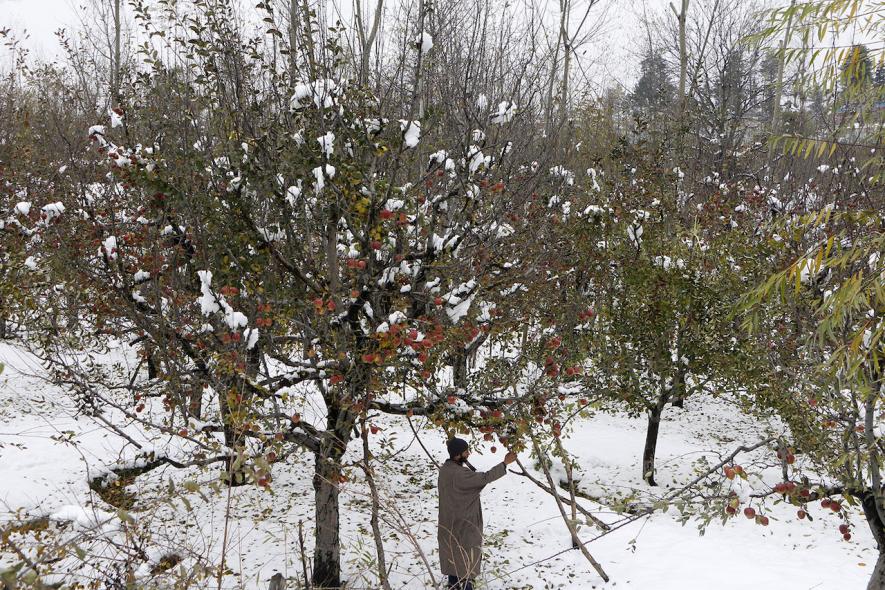Kashmir’s Fruit Growers Bear the Brunt of the Coronavirus Pandemic

File Photo.
From packaging to transportation, and a slump in rates, fruit growers from Kashmir are facing multiple problems in selling produce this year as the entire supply chain has been disrupted by the nationwide lockdown enforced to curb the COVID-19 pandemic.
The lockdown has badly hit the horticulture industry in Kashmir, as markets, retail shops, and transport services have all been shutdown.
The worst sufferers are the cherry growers, who are finding it hard to sell their crop despite a good produce. The farmers are worried as the lockdown has not only affected transportation, but has also led to the plummeting of demand. “There is no demand and the rates we get are also down as a result. Traders from Mumbai, Punjab, and in the markets of Delhi are refusing to accept our crop,” said Farooq Ahmad, a cherry-grower.
Farooq said that farmers used to send between 15 to 20 tonnes of fruit to markets outside the state on a daily basis at this time of the year. However, the pandemic has stalled the entire process. “We used to send our crop through trains or planes but the lockdown has crippled all such services,” he said.
Out of the total 15,000 metric tons of cherry that Kashmir produces every year, about 50% is exported to other states. Aside from that, about 5,000 metric tons are processed at 22 canning centers in Kashmir. These centres are also faced with challenges in the form of a lack of manpower and raw material.
Due to the introduction of a high-density variety of tree, Abdul Qayoom, a grower, told NewsClick that the farmers had a better yield this year, but the pandemic has ruined the entire season. “Everyone is scared to move around due to the coronavirus pandemic. The transporters, labourers and the buyers are all scared to venture out of their homes. In such a scenario, how will we sell our produce?” he asked.
The lack of boxes used for packaging cherries and the absence of workers also hampered the harvesting process. “We are unable to find the boxes or labourers. The labourers who used to come in from outside the valley were unable to reach the valley. We could not even get pesticides for our crop this year,” he said.
To tackle the issue, the horticulture department is mulling on transporting the crop in refrigerated vans. “We have sent a proposal to the government and are awaiting a response,” Ajaz Ahmad Bhat, Director Horticulture, told NewsClick. In addition, he said that the canning units would also be made functional.
For the apple industry, which had faced economic consequences due to the lockdown imposed after the Centre abrogated Article 370 of the Indian Constitution on August 5, 2019, the threat posed by the novel coronavirus has proven to be even greater.
Apple growers, who had resorted to cold storage to save their last harvest, in the hope that it would fetch better rates during the spring, are now a worried lot. They are not only facing difficulties in transporting their crop, but also struggling to find buyers in different markets across the country.
Asif Ahmad, an apple grower from south-Kashmir’s Shopian district, had stored around 1,200 boxes of apples from the last harvesting season. So far, he said, he has only sold 400 boxes, that too at lower rates. “By now, I would have sold my entire produce but that did not happen,” he said.
According to traders, before the COVID-19 lockdown was imposed, the demand for storage apples was satisfactory. Soon after the lockdown was imposed, demand fell, leading to a steep fall in prices. One kilogram of apple, growers said, which is usually sold at between Rs 100 and Rs 120 at this time of the year, fetched only Rs 50 to Rs 60.
Another problem the growers have been facing is the hot weather that spoils the fruit. “The shape of the fruit changes entirely, discouraging people from buying the fruit,” Shakoor Ahmad, a grower, told NewsClick.
He said that the usual fare for transporting apples is around Rs 15,000 per truck at this time of the year. However, to save the crop, they had to ferry apples in refrigerated trucks which charge about Rs 60,000, he said.
Crops like strawberries, which are consumed locally, suffered losses as well. The valley produces around 400 metric tons of strawberries and the harvesting period coincides with the tourist season in the valley, which keeps them in demand. This year, however, the demand has been at an all-time low, forcing growers to sell strawberries at half the price, or resort to throwing the crop away. “We used to get orders from hotels and barbeque shops which have been closed due to pandemic. I did not even manage to get back my labourer costs this year, and had to sell the crop a much lower price,” said Manzoor Ahmad, a strawberry grower.
The growers told NewsClick that there is no hope of any relief from the government, mentioning that it had not even compensated them for the damage caused to their crop by early snowfall in November 2019.
The President of the Jammu and Kashmir fruit growers cum dealers association seemed to have lost hope as well, with the government not enthusiastic about their demand for a Minimum Support Price for crops like cherry. “It is the only way by which the growers can be saved, but the government seems to be unmoved. They have suffered massive losses this year,” he said.
Get the latest reports & analysis with people's perspective on Protests, movements & deep analytical videos, discussions of the current affairs in your Telegram app. Subscribe to NewsClick's Telegram channel & get Real-Time updates on stories, as they get published on our website.
























